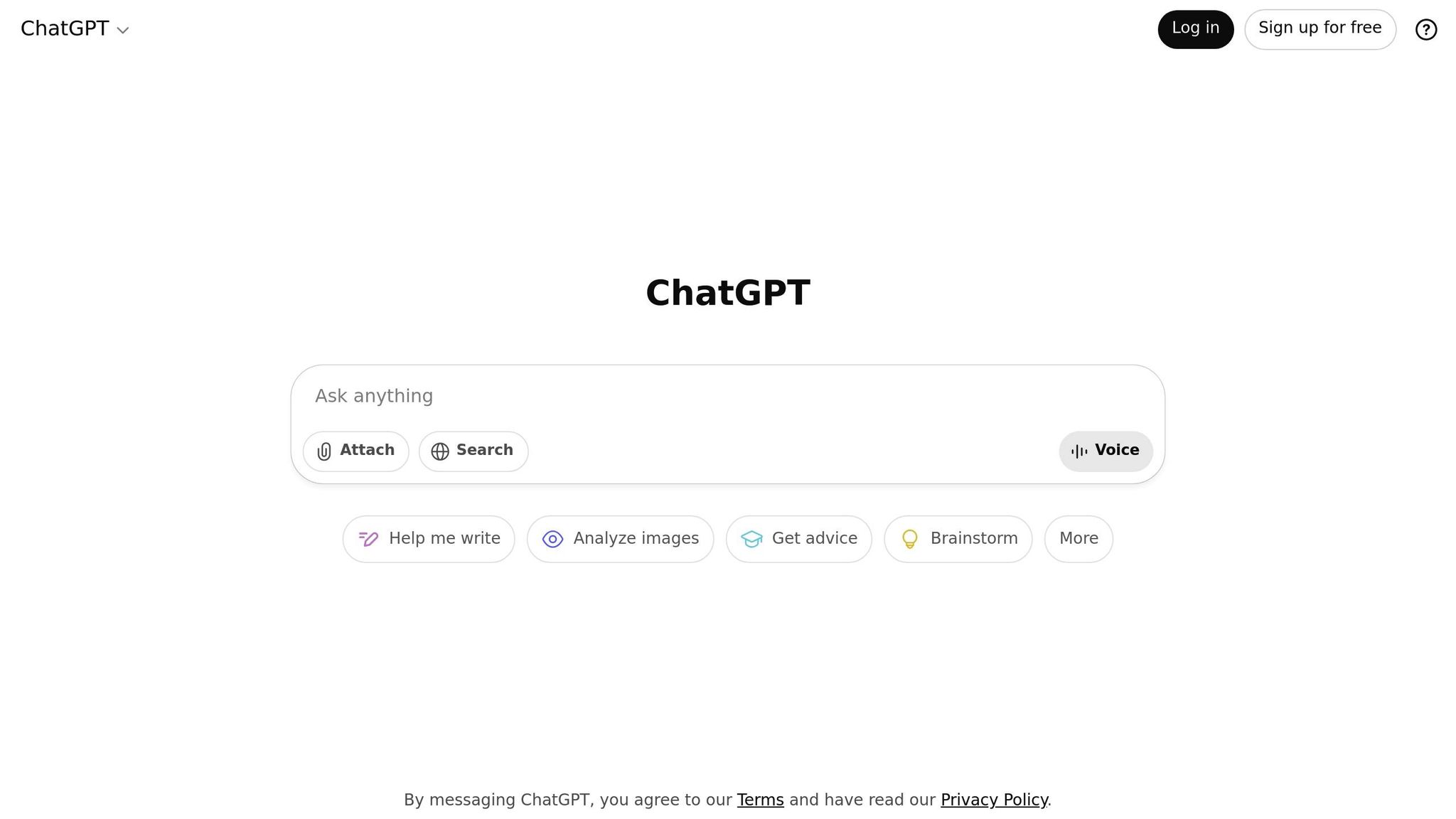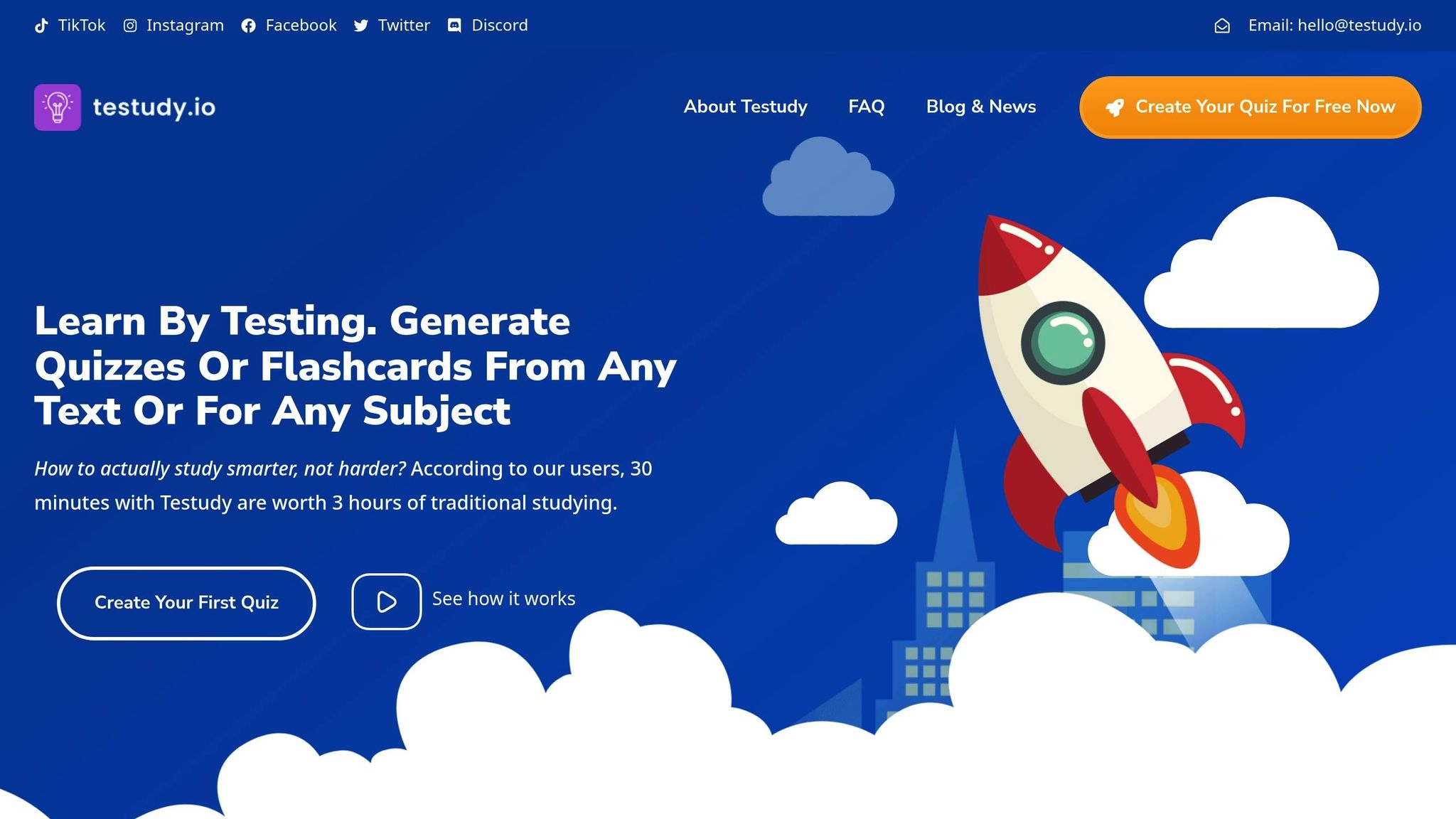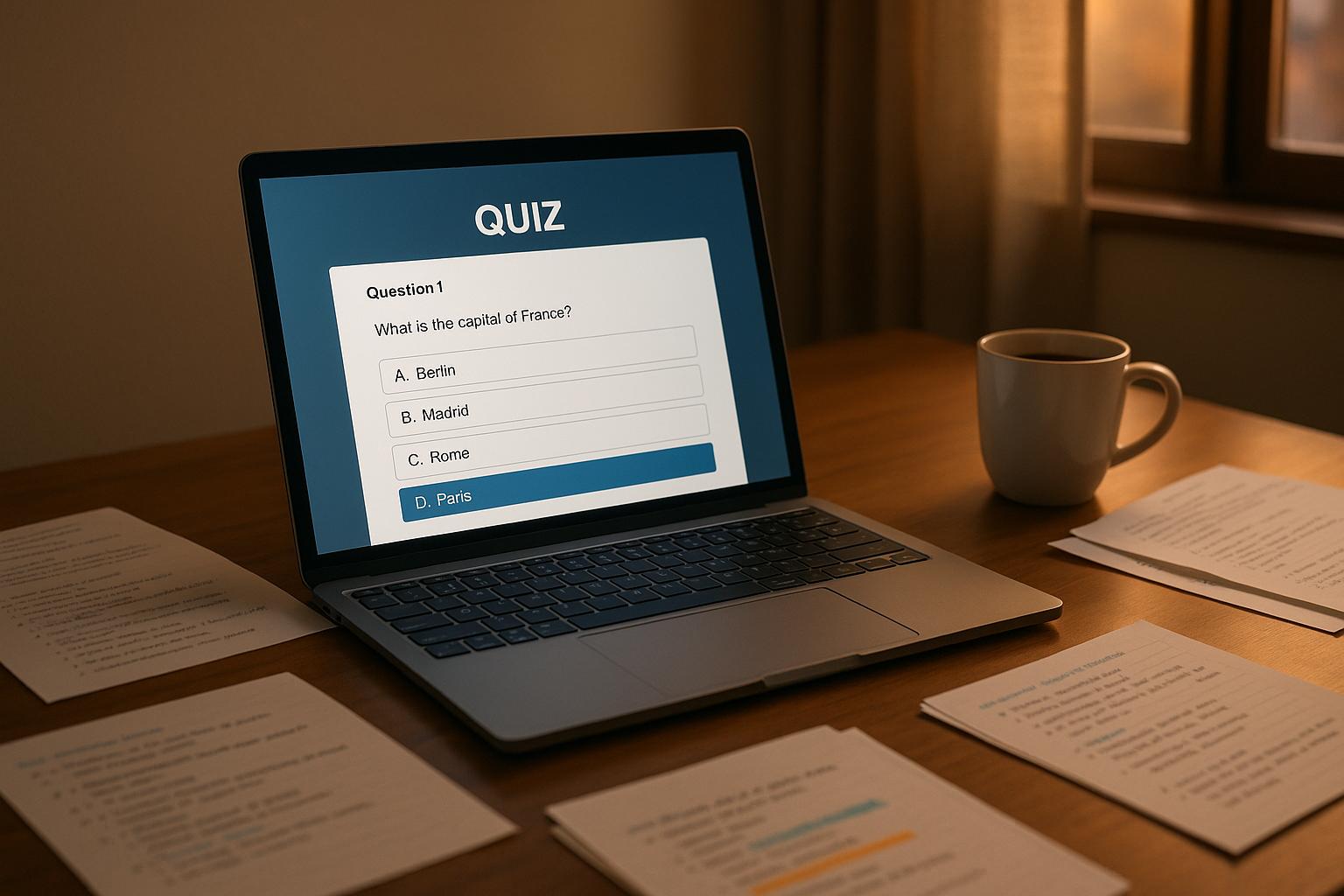AI quiz generators are transforming how we study by using neuroscience-backed techniques like active recall and spaced repetition to improve memory retention. These tools create personalized quizzes from study materials such as PDFs, notes, or slides, helping users focus on weak areas and retain information longer. Studies show that students using AI-based quizzes retain up to 70% of information after 30 days, compared to 20% with passive study methods.
Key points include:
- Active Recall: Strengthens memory by retrieving information instead of passively reviewing it.
- Spaced Repetition: Times reviews strategically to align with natural forgetting curves.
- Personalization: Quizzes adjust difficulty and focus on knowledge gaps.
- Efficiency: Tools like Testudy.io claim 30 minutes of use equals 3 hours of traditional studying.
- Progress Tracking: Tracks performance and suggests review schedules for better retention.
While these tools save time and improve learning outcomes, users should verify content accuracy and combine AI quizzes with active engagement for the best results.
Enhancing Learning by Using ChatGPT for Active Recall

The Science Behind Memory and Learning
Understanding how your brain stores and processes information sheds light on why AI quiz generators are so effective. These tools are built on three fundamental neuroscience principles: active recall, spaced repetition, and the connection between working memory and long-term memory. Each of these principles plays a key role in helping you learn more efficiently and retain information longer. Let’s break them down.
How Active Recall Strengthens Memory
Active recall pushes you to retrieve information from memory instead of passively rereading it. This process strengthens neural pathways, making it easier to remember information later. Research shows that retrieval practice is far more effective for learning than simply rereading material. In fact, students who use active recall consistently outperform those who rely on passive study methods.
Active recall also highlights areas where your understanding is weak, allowing you to focus on what needs improvement. You can practice active recall by testing yourself with flashcards, turning your notes into exam-style questions, or using a technique called "blurting" – writing down everything you can remember about a topic without looking at your notes. Explaining the material to someone else or summarizing it in your own words can also deepen your understanding.
How Spaced Repetition Improves Learning
Spaced repetition builds on active recall by timing your reviews strategically. Instead of cramming, this method spaces out your study sessions, revisiting material at intervals that align with your brain’s natural forgetting curve. By reviewing information just as you’re about to forget it, you strengthen your memory and make it easier to recall in the future.
"Perhaps the most important discoveries are those which relate to the appropriate distribution of the periods of study… Acts of revision should be spaced in gradually increasing intervals, roughly intervals of one day, two days, four days, eight days, and so on." – C. A. Mace, Psychology of Study
One study found that participants who reviewed words once every two months over a 26-week period achieved the highest test scores even after five years. Spaced repetition not only enhances learning but also reduces the total time spent studying. To use it effectively, summarize key points right after a lesson, then review them the next day, three days later, and one week later. Adjust the intervals based on how challenging the material is and how quickly you learn.
Working Memory and Long-Term Learning Connection
The relationship between working memory and long-term memory is crucial for understanding how AI quiz generators optimize learning. Working memory acts as a temporary storage space, holding a limited amount of information at a time, while long-term memory serves as a vast archive for later recall. Because working memory has limited capacity, it can become a bottleneck when learning new concepts. However, long-term memory helps by organizing and chunking information, which frees up working memory for more learning.
"Memory is the ‘residue of thought’" – Professor Daniel Willingham
The quality of what’s held in working memory directly impacts how well it’s stored in long-term memory. Effective learning depends on managing the limited capacity of working memory to ensure accurate long-term storage. Overloading it can hinder learning. Since working memory capacity varies from person to person, personalized learning approaches are especially effective.
To strengthen this connection, focus on linking new information to what you already know, seek clear explanations, and use concrete examples. Break complex skills into smaller steps to build solid schemas in long-term memory, which in turn expands your working memory’s capacity. Retrieval practice – central to AI quiz generators – further reinforces these connections. By leveraging these principles, AI quiz generators tailor the learning process to maximize your brain’s potential.
How AI Quiz Generators Adapt to Your Learning
AI quiz generators are reshaping the way we learn by tailoring study materials to fit individual needs. By analyzing your performance data, these tools create quizzes that align with your strengths and focus on areas that need improvement. This approach is grounded in neuroscience, helping you study smarter, not harder.
Personalized Quiz Content and Question Types
These intelligent systems adjust quiz difficulty based on your progress. If you’re breezing through questions, they’ll present more challenging ones. Struggling in certain areas? They’ll provide targeted questions to reinforce your understanding. It’s like having a tutor who knows exactly where you need help.
A study from Stanford University found that students using AI-driven personalized learning tools improved their memory retention by 30% in just one month compared to traditional textbook methods.
AI quiz generators also offer a mix of question types – multiple choice, fill-in-the-blank, matching, and open-ended – catering to different learning styles. You can even customize quizzes by tweaking question formats, difficulty levels, or focusing on specific topics.
"AI integration allows for changing the question type, correcting grammatical errors & my personal favorite, replacing the question with a similar one – all generated by AI! Major teacher time-saver!" – Evan Mosier, Tech Innovator, Davenport Community Schools
Progress Tracking and Review Recommendations
These tools don’t just quiz you – they track your progress and recommend what to focus on next. Using advanced metrics like performance trends and review frequency, AI quiz generators identify the best times to revisit topics based on your forgetting curve. Spaced repetition, a proven learning technique, can boost long-term retention by 50%, according to research.
The system also evaluates past quiz results to generate follow-up questions targeting weaker areas. Topics you’ve mastered show up less often, while challenging ones are revisited until you’ve got them down.
Multi-Language and Format Options
AI quiz generators are designed for learners from all walks of life, offering support in over 20 languages and adapting to various content formats. Whether your study materials are PDFs, videos, text documents, or audio files, these tools can create quizzes tailored to your resources.
They also adjust content complexity to suit different skill levels, making them particularly useful for English language learners or students with varying proficiencies. As Nikki Jones, an Instructional Technology Coach, explained:
"I love how easy it is to convert what you are already [doing] using AI. The ability to change the language level would be really helpful for our English Language learners! The possibilities are endless." – Nikki Jones, Instructional Technology Coach, Chris Yung Elementary
This flexibility ensures that AI quiz generators can accommodate diverse learners, adapting to different subjects, languages, and skill levels. By combining accessibility with neuroscience-backed methods, these tools are paving the way for smarter, more effective study practices.
sbb-itb-3165b23
Using Testudy.io for Science-Based Study

Testudy.io takes the neuroscience principles discussed earlier and transforms them into practical tools for studying more effectively. This AI-driven platform is designed to maximize retention by offering personalized quizzes and flashcards based on proven memory techniques. With 97% of students satisfied and 90% positive reviews, it’s no surprise that users report that just 30 minutes with Testudy.io can equal 3 hours of traditional studying. This efficiency comes from its use of active recall and spaced repetition, which help reinforce learning at the right intervals. Let’s dive into how you can make the most of these features.
Step-by-Step Guide to Creating Quizzes
Creating quizzes with Testudy.io is quick and straightforward, thanks to its AI-powered tools.
- Upload Your Materials: Add your study materials – whether it’s PDFs, lecture notes, or text documents – or simply specify a topic.
- Customize Your Quiz: Set your preferences for question types, difficulty levels, and focus areas.
- Generate and Review: The platform generates personalized questions instantly, which you can review and refine as needed.
- Study and Track Progress: Use your quizzes repeatedly to test your knowledge, get instant feedback, and monitor your performance.
For added convenience, Testudy.io offers a Chrome extension that lets you create quizzes directly from any webpage, screenshot, or selected text.
Key Features of Testudy.io
Testudy.io goes beyond basic question generation by offering tools that adapt to your learning needs. It focuses on areas where you need improvement while reinforcing what you already know.
One standout feature is Multi-Language Support, which allows you to study in over 20 languages, including English, German, Spanish, Italian, Chinese, and Japanese. The platform also encourages collaboration by letting users share quizzes with one another.
Here’s a breakdown of its pricing plans:
| Plan | Price | Features | Ideal for |
|---|---|---|---|
| Free | $0/month | Up to 3 quizzes, 25 AI generations | Trying the platform |
| Semester | $20.79/month* | Unlimited quizzes and generations | Short-term intensive study |
| Term | $12.99/month* | Unlimited quizzes and generations | Long-term learning goals |
*Prices converted from £15.99 and £9.99, respectively. Use coupon STUDY4SEMESTER20 for 20% off the Semester plan or STUDY4TERM30 for 30% off the Term plan.
Improving Study Efficiency with Testudy.io
Testudy.io’s features are designed to boost your study efficiency in a variety of ways:
- Pre-Study Priming: Generate quizzes on your study topics ahead of time to identify key concepts and focus areas before diving in.
- Adaptive Difficulty: The platform adjusts question difficulty based on your performance, keeping the material engaging without becoming too easy or overly challenging.
- Progress Tracking: Get detailed insights into your progress. The platform pinpoints areas that need more attention and suggests when to revisit topics, aligning perfectly with spaced repetition strategies.
Additionally, the ability to customize quizzes – by selecting question types, difficulty levels, and focus areas – means you can tailor your learning experience to suit your personal study habits and goals.
Benefits and Limitations of AI Quiz Generators
AI quiz generators, like Testudy.io, are reshaping the way we approach studying and teaching, offering exciting possibilities while presenting a few challenges to consider. By understanding their strengths and limitations, you can make the most of these tools in your learning journey.
Benefits of AI Quiz Generators
One of the standout advantages of AI quiz generators is the time they save. A recent study found that 63% of teachers using these tools save between 1–5 hours per week, with some reporting up to a 90% reduction in the time spent on quiz creation compared to traditional methods. This means quicker setup and more time for actual learning.
Another key benefit is personalization. These tools analyze individual learning patterns to create questions that address specific knowledge gaps. In fact, students who used adaptive AI quiz systems scored 62% higher than those who didn’t. This tailored approach can significantly boost learning outcomes.
AI quiz generators also improve accessibility by offering high-quality study materials to a broad audience. For example, Testudy.io provides a robust free version, ensuring that effective study tools are available to more people, regardless of budget.
Beyond quizzes, these tools are incredibly versatile. They can generate practice tests, flashcards, summaries, and even explanations of complex topics, all based on input like lecture notes, assignments, or textbook chapters. This adaptability caters to different learning styles, making it easier to find an approach that works for you.
Things to Consider for Best Results
While the benefits are clear, there are some limitations to keep in mind. One major issue is content accuracy. AI-generated quizzes are not flawless – studies show that error rates can reach 16%, with 40% of the content requiring significant editing. It’s crucial to double-check the accuracy of questions before using them.
Another concern is the risk of over-reliance. These tools should enhance your study process, not replace active engagement with the material. Combining AI quizzes with active learning strategies, like self-explanation or group discussions, tends to produce better results.
Quality control is another factor to consider. The effectiveness of AI-generated quizzes depends on the quality of the input material. If the source content is incomplete or inaccurate, the output will reflect those issues. Providing detailed, accurate input is essential for reliable results.
Lastly, there’s a learning curve involved in using these tools effectively. To get the most out of them, you’ll need to spend some time mastering customization options, interpreting analytics, and integrating the generated content into your broader study routine.
These challenges highlight the importance of balancing AI tools with traditional study methods. The table below offers a quick comparison of the main benefits and drawbacks.
Pros and Cons Comparison
| Aspect | Pros | Cons |
|---|---|---|
| Time Efficiency | Saves up to 90% of time compared to manual quiz creation | |
| Personalization | Creates tailored questions based on learning needs; boosts scores | |
| Content Quality | Offers diverse question formats | 16% error rate; requires content verification |
| Accessibility | Free versions available; supports multiple languages | Premium features can cost $20–$100 monthly |
| Learning Impact | Encourages active recall and spaced repetition | Risk of over-dependence on AI tools |
| Engagement | Provides interactive, real-time feedback |
AI quiz generators also excel at turning raw performance data into actionable insights, helping learners identify strengths and weaknesses more effectively than manual methods. When combined with their time-saving and personalized features, these tools can become a powerful addition to a well-rounded study routine.
Conclusion
AI quiz generators are transforming the way we learn by significantly improving memory retention. Studies reveal that students using these tools retain around 70% of information after 30 days, compared to just 20% with traditional study methods. The secret lies in neuroscience-backed techniques like active recall and spaced repetition.
One standout feature of these tools is their ability to personalize learning. Unlike one-size-fits-all study resources, AI quiz generators adapt to your unique learning patterns. They pinpoint your weak areas and adjust the difficulty of questions accordingly. In fact, students using adaptive AI quiz systems have achieved scores 62% higher than those relying on traditional methods. This highlights how tailored learning experiences can make a real difference.
Another major benefit is the time saved on study preparation. Instead of spending hours creating flashcards or notes, these tools streamline the process so you can focus on actual learning. For example, users of Testudy.io report that just 30 minutes on the platform can be as effective as 3 hours of conventional studying. This not only boosts efficiency but also makes high-quality study tools more accessible.
Speaking of accessibility, platforms like Testudy.io cater to a diverse audience by supporting over 20 languages and covering a wide range of subjects. This ensures that learners from various economic and educational backgrounds can benefit from these advanced tools.
To maximize their potential, AI quiz generators should be paired with active study habits and critical thinking. They work best as a supplement to deeper learning strategies. Ensuring high-quality input materials and regularly reviewing AI-generated content are also key to achieving the best results.
FAQs
How do AI quiz generators create personalized quizzes to help me learn more effectively?
AI-powered quiz generators are designed to make studying smarter and more focused. Using advanced algorithms, they can evaluate your performance, identify areas where you struggle, and create quizzes that specifically target those gaps in your knowledge.
For instance, if you consistently miss questions on a certain topic, the AI will adapt by offering more questions in that area. This not only reinforces your understanding but also boosts your retention of the material. With this personalized learning approach, you can focus on what matters most, build confidence, and tackle the material with greater efficiency.
How do active recall and spaced repetition improve memory retention?
Active recall and spaced repetition tap into how our brains naturally work to improve memory. Active recall is all about pulling information from your memory, which strengthens your ability to remember it later. On the other hand, spaced repetition involves revisiting material at gradually increasing intervals, helping to move knowledge from short-term to long-term memory.
When combined, these methods align with how our brains learn best, making study time more productive. Tools like AI-powered quizzes and flashcards, such as those available through Testudy, make it simple to put these strategies into action, helping you remember more and study more effectively.
How can I make sure AI-generated quiz content is accurate, and what steps should I take if I notice mistakes?
To keep AI-generated quiz content accurate, begin by confirming the reliability of the source material. A thorough human review process is essential to double-check the content and offer constructive feedback, helping improve the AI’s performance over time.
When errors are spotted, correct them promptly and analyze how the AI produced the content to pinpoint gaps or inconsistencies. Adding extra layers of quality control, like fact-checking or validation steps, can further boost reliability. Regularly revisiting and updating the AI’s output ensures your quizzes stay precise and trustworthy.




